
Top Mobile Internet for RV in 2025 | Stay Connected Everywhere
Posted by James on
Hitting the Road, Staying Connected: Choosing the Right Mobile Internet for Your RV
Finding reliable mobile internet for RV life can be tough. This list cuts through the confusion, presenting seven top options for staying connected on the road in 2025. Whether you need to work remotely or stream movies, we'll help you find the best solution. We'll compare the pros and cons of SwiftNet Wifi, Verizon Wireless RV Internet Plan, Starlink Roam, T-Mobile 5G Home Internet, Nomad Internet, NETGEAR Nighthawk M6 Pro Mobile Hotspot, and Pepwave MAX Transit Duo, so you can enjoy uninterrupted connectivity wherever your RV takes you.
1. SwiftNet Wifi
Staying connected on the road is no longer a luxury, it's a necessity, especially for RV travelers, remote workers, and those living in rural areas. SwiftNet Wifi aims to address this need by offering lightning-fast 5G internet connectivity specifically designed for those underserved by traditional internet providers. Whether you're working remotely from your RV, streaming movies in the middle of nowhere, or simply trying to stay in touch with loved ones, SwiftNet Wifi promises to deliver a reliable and high-speed connection. It bridges the digital divide by leveraging cutting-edge 5G technology to bring high-speed internet access to places where conventional providers, like fiber optic companies, simply can't reach. This makes it a compelling option for anyone looking for reliable mobile internet for RV travels and rural living.
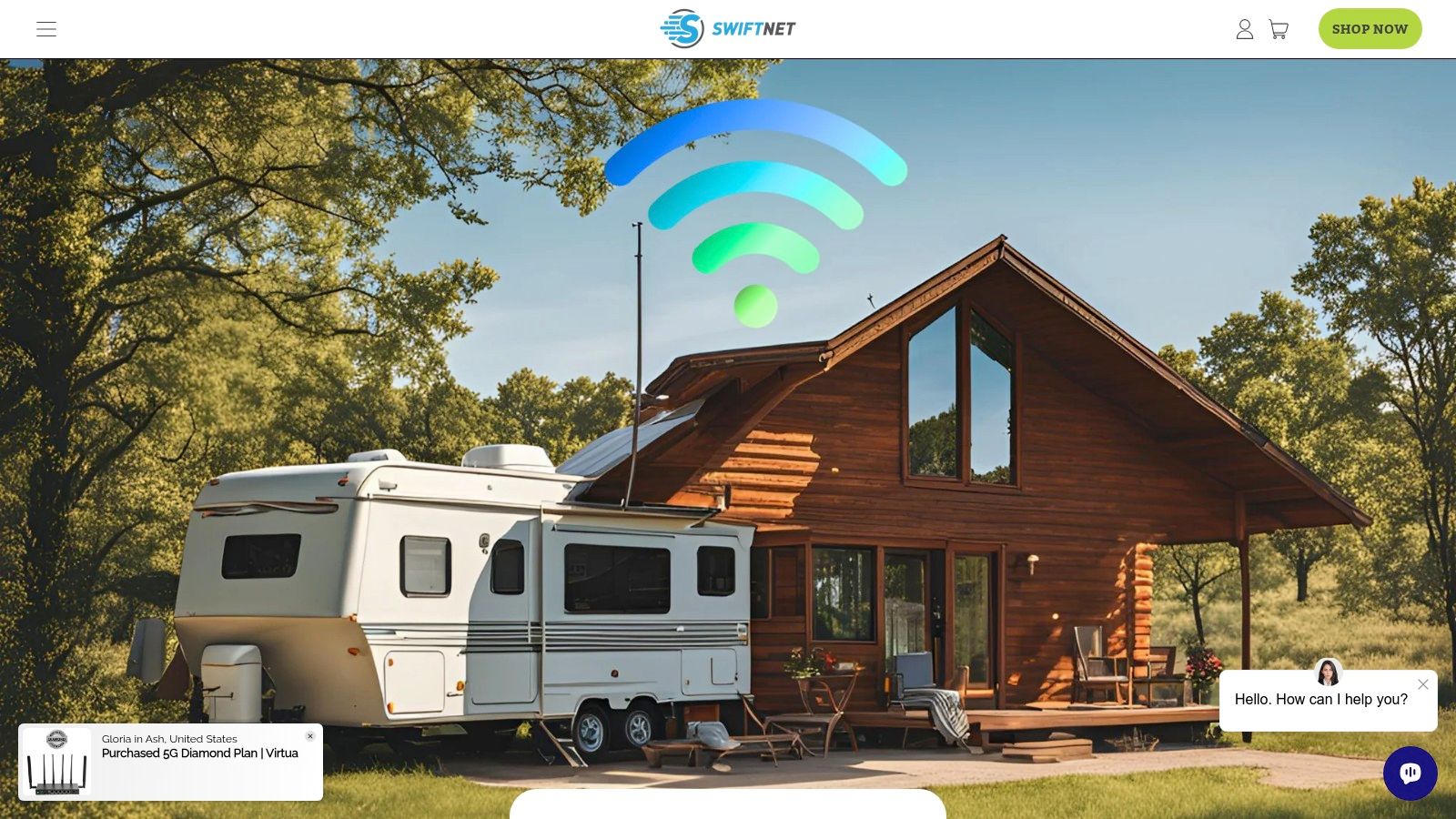
One of the key advantages of SwiftNet Wifi is its flexibility. They offer tailored service plans designed to meet the specific needs of both permanent rural residents and transient RV users. This means you can choose a plan that aligns with your data usage and budget, whether you're a full-time RVer or simply escaping to the countryside for a weekend getaway. For digital nomads and remote workers, the reliable connectivity ensures seamless video conferencing, file sharing, and access to cloud-based applications. Imagine attending virtual meetings from your RV parked overlooking a breathtaking mountain vista, all thanks to the power of 5G. Learn more about SwiftNet Wifi for details on their blog posts and articles. SwiftNet Wifi emphasizes a strong commitment to reliable performance in areas traditionally underserved by internet providers, evidenced by positive customer testimonials praising its dependability in remote locations.
Pros:
- Provides high-speed 5G internet in rural and remote locations where fiber optic is unavailable.
- Tailored service plans ideal for both RV travelers and rural residents.
- Enables reliable connectivity for remote work and streaming on the go.
- Uses advanced 5G technology for fast and stable internet connections.
- Strong customer approval for dependable performance in traditionally underserved areas.
Cons:
- Pricing details are not readily available online, requiring direct inquiry.
- Service availability depends on 5G network coverage, which may be limited in extremely remote regions.
While the exact pricing isn't listed on their website, the potential benefits of having high-speed internet access in remote locations make SwiftNet Wifi worth investigating. Visiting their website, https://swiftnetwifi.com, is the best way to obtain specific pricing information and determine if 5G coverage is available in your desired travel or residential area. By contacting SwiftNet directly, you can obtain a customized quote and learn more about the specific technical requirements and setup procedures for their service. While the lack of readily available pricing information is a minor drawback, the promise of reliable high-speed internet in places where few other options exist makes SwiftNet Wifi a strong contender for anyone seeking consistent mobile internet for their RV or rural home.
2. Verizon Wireless RV Internet Plan
For RVers seeking reliable mobile internet, Verizon often tops the list. Their expansive network coverage across the United States, particularly in rural areas, makes them a strong contender for staying connected on the road. Whether you're checking emails, streaming movies, or working remotely from your RV, Verizon's 4G LTE and growing 5G network aim to provide the bandwidth you need. This makes them an attractive option for mobile internet for RV needs.
Verizon offers several unlimited data plans tailored for mobile hotspot use with your RV. While they advertise unlimited data, it's important to understand the fine print. These plans often come with tiered prioritization, meaning your speeds might be throttled after you reach a certain data threshold, especially during times of network congestion. While their premium unlimited plans offer higher priority and more high-speed data before throttling, they also come at a premium price. A key advantage for RVers is compatibility with most aftermarket signal boosters. This can be crucial for maintaining a stable connection, especially in remote areas where the signal might be weaker. For budget-conscious users, Visible by Verizon, a prepaid service operating on Verizon's network, provides more affordable unlimited options, although with lower prioritization.
Features:
- Largest 4G LTE coverage area in the United States
- Expanding 5G network in urban and some rural areas
- Unlimited plans with hotspot data allocations
- Compatible with most aftermarket signal boosters
- Visible by Verizon offers more affordable unlimited data options
Pros:
- Superior Coverage: Provides a reliable signal in rural and remote locations, essential for RV travelers venturing off the beaten path.
- Reliable Connection Speeds: Even in congested areas, Verizon’s network prioritization aims to maintain decent speeds for its premium users.
- Strong Infrastructure: Continuous network improvements and expansions ensure a consistently evolving and reliable connection.
- Multiple Device Support: Connect multiple devices simultaneously, accommodating the whole family's connectivity needs.
Cons:
- Higher Cost: Verizon plans generally command a higher price point compared to other carriers.
- Potential Throttling: While plans are marketed as “unlimited,” speeds may be throttled after exceeding certain data limits, particularly on less expensive plans.
- Limited Truly Unlimited Hotspot Options: Truly unlimited, unthrottled hotspot options are limited and often expensive.
Website: https://www.verizon.com/plans/
Implementation Tips:
- Check Coverage Maps: Before committing, meticulously review Verizon's coverage maps for your planned travel routes. Pay particular attention to the availability of 4G LTE and 5G in your destinations.
- Consider a Signal Booster: If you plan to frequent areas with weaker signals, investing in a compatible signal booster is highly recommended to enhance your connection stability.
- Compare Plans Carefully: Carefully compare the various Verizon plans and Visible by Verizon to find the best balance of cost, data allowance, and prioritization to suit your specific needs.
- Monitor Data Usage: Keep track of your data consumption to avoid unexpected throttling.
Verizon earns its place on this list due to its wide-ranging coverage, especially in rural areas often frequented by RVers. While the cost is a factor to consider, the reliability and performance, especially when paired with a signal booster, can be a worthwhile investment for those prioritizing consistent mobile internet access for their RV travels. This consistent connectivity is especially crucial for those who work remotely or rely heavily on internet access for entertainment and communication while on the road.
3. Starlink RV (now called Starlink Roam)
For RV enthusiasts seeking reliable mobile internet, Starlink Roam (formerly Starlink RV) offers a compelling solution, especially for those venturing off the beaten path. This satellite internet service from SpaceX utilizes a network of low Earth orbit satellites to deliver high-speed internet access virtually anywhere you have a clear view of the sky, making it a game-changer for mobile internet for RV use. This is particularly beneficial for travelers who frequent remote locations where cellular and traditional internet options are limited or nonexistent. Whether you're boondocking in the desert or exploring national parks, Starlink Roam aims to keep you connected.
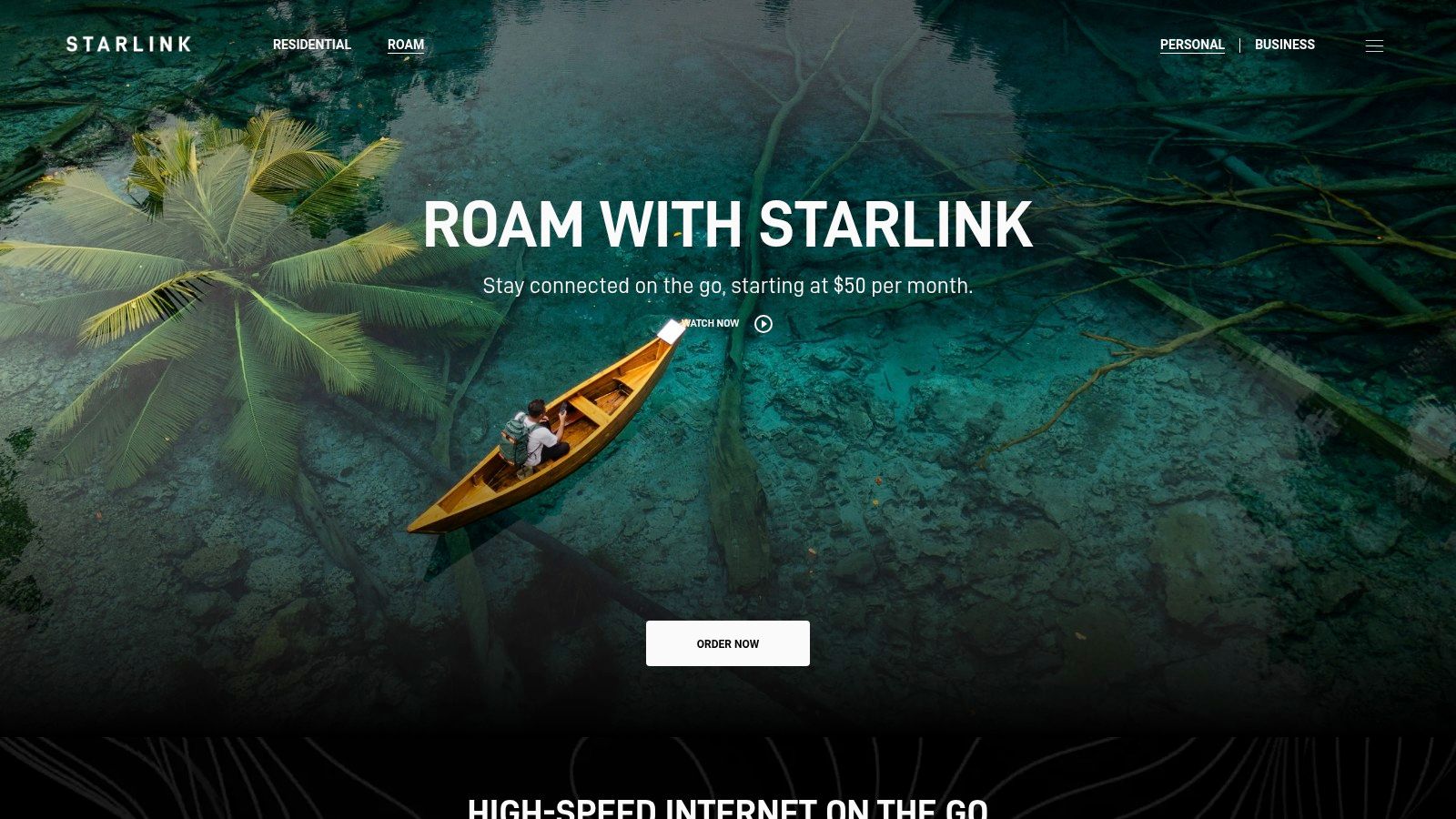
Starlink Roam offers two service plans tailored to different travel styles: Regional and Global. The Regional plan allows you to maintain consistent service within your chosen continent, while the Global plan provides seamless connectivity as you traverse the globe. This flexibility makes it an ideal choice for both domestic and international RV travelers. The service boasts download speeds between 40-220 Mbps in most locations, more than enough bandwidth for streaming, video conferencing, and online gaming. A key advantage of Starlink Roam is its truly unlimited data policy, meaning no throttling or data caps, unlike many cellular plans.
The portability of the Starlink Roam system is another significant benefit for RV users. The equipment is designed for mobile use and includes a self-aligning dish that simplifies setup. You won’t need professional installation, and you can quickly pack and deploy the system at each new location. For those who only use their RV seasonally, Starlink Roam offers the convenience of pausing the service during inactive months, saving you money during periods of non-use.
Technical Requirements and Pricing:
The Starlink Roam kit costs $599 for the standard hardware. The monthly service fee is $150 for the Regional plan and $200 for the Global plan. The main technical requirement is an unobstructed view of the sky for the satellite dish to function optimally. It's important to note that the system does consume a significant amount of power, so adequate power management within your RV is essential.
Pros and Cons:
Pros:
- Works in remote areas with no cellular service
- No data caps or throttling
- Consistent performance unaffected by local network congestion
- Easy DIY setup
Cons:
- Higher upfront equipment cost ($599)
- Monthly service cost is higher than some cellular options ($150/$200)
- Requires a clear view of the sky and consumes significant power
- Larger equipment footprint compared to cellular hotspots
Implementation Tips:
- Plan your RV parking to ensure an unobstructed view of the sky. Use the Starlink app to identify optimal dish placement.
- Monitor your RV's power consumption when using Starlink Roam. Consider investing in additional battery capacity or solar panels if necessary.
Starlink Roam stands out as a viable option for mobile internet for RV living, offering consistent high-speed connectivity even in the most remote locations. While the cost is higher than some alternatives, the reliability and unlimited data make it a worthwhile investment for serious RV travelers and those who rely heavily on internet access while on the road. For more information, visit the official website: https://www.starlink.com/roam
4. T-Mobile 5G Home Internet
For RVers seeking a reliable and affordable mobile internet solution, T-Mobile 5G Home Internet presents a compelling, albeit slightly unconventional, option. While technically designed for stationary homes, its ease of use, unlimited data, and attractive price point have made it a popular choice among those seeking mobile internet for RV life. This makes it worthy of consideration for anyone looking to stay connected on the road.
T-Mobile 5G Home Internet operates through a dedicated gateway device that receives T-Mobile's 4G/5G signal and broadcasts a Wi-Fi network within your RV. This eliminates the need for separate hotspots or complicated configurations, providing a plug-and-play experience similar to a traditional home internet setup. The gateway also includes a battery backup, offering a short window of connectivity during power outages, a valuable feature for RV travelers.
One of the biggest draws of T-Mobile 5G Home Internet is its straightforward pricing. For $50/month with autopay, you get truly unlimited data, meaning no caps or throttling. This is a significant advantage compared to many mobile hotspot plans that impose data limits or significantly reduce speeds after a certain threshold. This unlimited data plan is a game-changer for digital nomads working from their RVs or families streaming movies on the road. There are no contracts or equipment rental fees, offering flexibility and cost savings.
Features & Benefits:
- Unlimited Data: Enjoy unrestricted browsing, streaming, and downloading without worrying about data caps or speed throttling.
- Dedicated Gateway: The provided gateway acts as both a modem and a Wi-Fi router, simplifying setup and providing a reliable connection.
- Flat-Rate Pricing: $50/month with autopay offers predictable budgeting and excellent value for unlimited data.
- No Contracts: Enjoy the freedom to cancel the service at any time without penalty.
- Battery Backup: Stay connected during short power outages thanks to the gateway's built-in battery.
- Expanding 5G Network Coverage: Benefit from T-Mobile's growing 5G network for faster speeds in more locations.
Implementation & Setup Tips:
Setting up T-Mobile 5G Home Internet in your RV is remarkably simple. Just plug in the gateway device, connect your devices to the Wi-Fi network, and you're online. However, since the service isn't officially designed for mobile use, consider these tips:
- Check Coverage: Use T-Mobile's coverage map to ensure adequate signal strength at your intended destinations. Keep in mind that reported coverage can differ from actual experience, especially in rural areas.
- Monitor Performance: Be aware that performance can fluctuate based on location and network congestion. Test the service in different areas before committing long-term.
- Consider a Signal Booster (Optional): While not required, a cellular signal booster can improve reception in areas with weak signal strength.
Pros & Cons:
Pros:
- Affordable fixed price compared to other mobile internet options.
- True unlimited data without throttling or overage charges.
- Equipment includes battery backup for short-term power outages.
- No additional equipment needed beyond the gateway.
Cons:
- Official terms of service don't explicitly allow for mobile use, although many RVers utilize it successfully.
- Coverage, particularly in remote areas, isn't as extensive as some competitors like Verizon.
- Performance can be inconsistent and vary significantly based on location.
- Data may be deprioritized during periods of network congestion.
Website: https://www.t-mobile.com/home-internet
T-Mobile 5G Home Internet is an attractive option for mobile internet for RV use, especially for those prioritizing affordability and unlimited data. While it's crucial to acknowledge the unofficial nature of its mobile application and potential coverage limitations, its simplicity, cost-effectiveness, and performance in many areas make it a viable solution for staying connected on the road. If you primarily travel in areas with good T-Mobile coverage and need a large amount of data at a reasonable price, T-Mobile 5G Home Internet is definitely worth exploring.
5. Nomad Internet
Nomad Internet is a popular choice for mobile internet for RV enthusiasts, particularly those who prioritize reliable connectivity and high data usage. Targeting digital nomads, RVers, and rural residents, they aim to provide consistent internet access no matter where your travels take you. They achieve this by reselling access to major cellular networks like AT&T, T-Mobile, and Verizon, packaging them into plans specifically designed for the mobile lifestyle. This allows for flexibility and the potential for better coverage than relying on a single carrier.
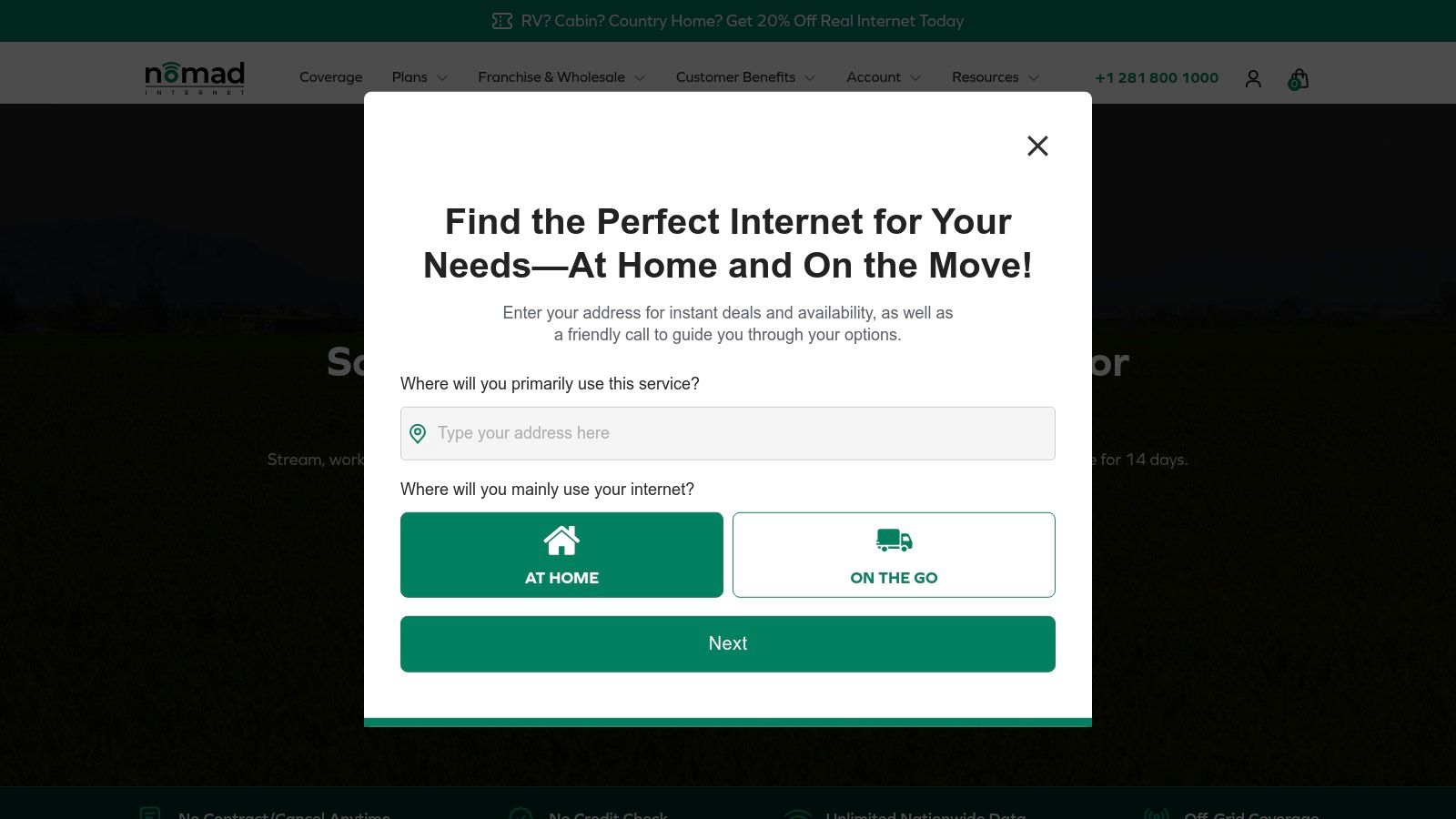
One of Nomad Internet's key selling points is its specialized hardware. They offer routers designed specifically for RV use, often with external antenna options to boost signal strength. This is crucial for maintaining a stable connection, especially in areas with weaker cell signals. They understand the unique challenges of mobile internet for RV living and cater their services accordingly. For example, they offer unlimited data plans, recognizing the high bandwidth demands of remote work and streaming entertainment on the road. This eliminates the worry of data overage charges and allows you to fully utilize your internet connection. Furthermore, they offer month-to-month service with no contracts, providing flexibility for those whose travel plans change frequently. Learn more about Nomad Internet
While Nomad Internet offers compelling advantages, it's essential to consider the potential drawbacks. As a reseller, their plans often come at a higher monthly cost compared to going directly through a carrier. Network management policies may also be in place, potentially prioritizing certain types of traffic or throttling speeds during peak congestion. The cost of their specialized routers also adds to the initial investment. Finally, while they aim to provide dedicated customer support for mobile users, some user reviews report inconsistencies in service quality.
For those seeking a comprehensive mobile internet for RV solution with a focus on high data usage and reliable hardware, Nomad Internet can be a viable option. The flexibility of choosing between multiple carriers and the availability of unlimited data plans makes it appealing for full-time RVers and remote workers. However, it’s crucial to weigh the higher costs against the potential benefits and consider your individual needs and budget before committing. If consistent customer support and the most affordable pricing are your top priorities, exploring direct carrier options might be a worthwhile alternative.
6. NETGEAR Nighthawk M6 Pro Mobile Hotspot
The NETGEAR Nighthawk M6 Pro Mobile Hotspot stands out as a premium option for RV travelers seeking reliable and high-speed mobile internet. Designed for demanding users, this hotspot prioritizes performance and connectivity, making it ideal for streaming, working remotely, and staying connected on the road. Whether you're parked in a bustling RV park or exploring a remote national park, the M6 Pro aims to provide a robust internet connection for all your devices.
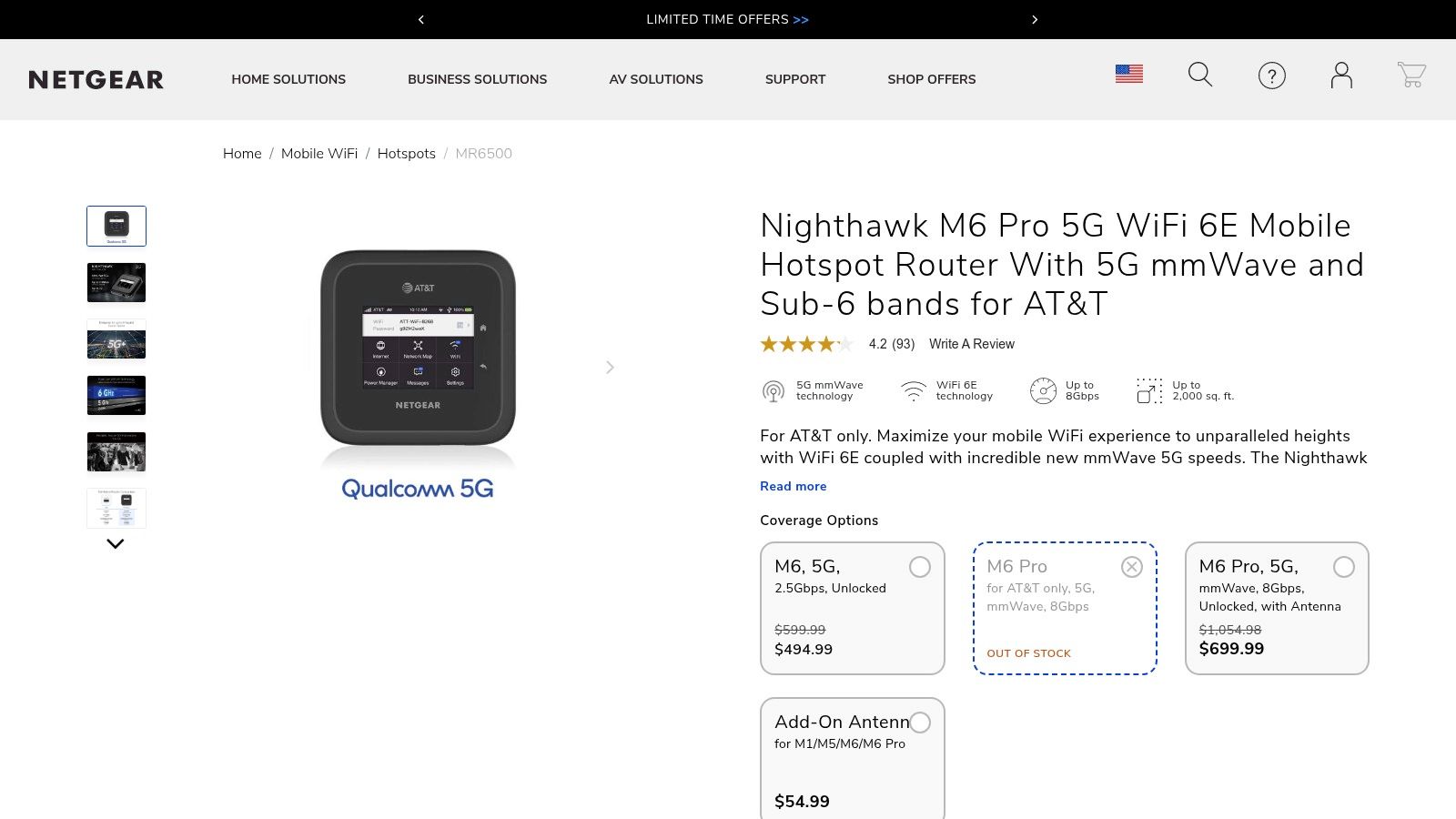
This powerful hotspot supports both 5G and 4G LTE connectivity, offering blazing-fast speeds of up to 2.5 Gbps where available. Of course, actual speeds depend on your carrier's network and location. It’s compatible with major carriers such as AT&T and T-Mobile, giving you flexibility in choosing a plan that suits your needs. The intuitive touchscreen interface makes it easy to monitor data usage, adjust settings, and manage connected devices. A robust 6,000 mAh removable battery ensures all-day usage, and the option to use spare batteries eliminates range anxiety for extended trips. The M6 Pro also supports connecting up to 32 devices simultaneously via its dual-band WiFi 6 (2.4GHz and 5GHz), ideal for families or those traveling with multiple devices. For a more stable connection, particularly for bandwidth-intensive tasks, the included Ethernet port offers a wired connection option. Furthermore, external antenna ports provide the possibility of boosting the signal in remote areas with weak cell service, a crucial feature for RV travelers venturing off the beaten path.
One of the M6 Pro's standout features is its flexibility. Beyond its wireless capabilities, the Ethernet port allows you to connect devices like gaming consoles or smart TVs directly for a lag-free experience. This makes the Nighthawk M6 Pro a versatile solution for maintaining a robust internet connection in your RV, regardless of your location or the demands of your online activities. You can learn more about NETGEAR Nighthawk M6 Pro Mobile Hotspot.
While the NETGEAR Nighthawk M6 Pro offers exceptional performance and features for mobile internet for RV use, it's essential to consider the cost. The device itself has a high price point (approximately $999.99), and you'll also need a separate data plan from your chosen carrier. Additionally, the M6 Pro can be carrier-locked depending on the model you purchase, limiting your flexibility to switch carriers. Finally, it's larger than basic hotspots, which might be a consideration for those with limited space.
Pros:
- Premium performance with 5G and 4G LTE support
- Touchscreen interface for easy management
- Removable battery for extended use
- Ethernet port and external antenna ports for enhanced connectivity
- Supports up to 32 devices simultaneously
Cons:
- High device cost and requires a separate carrier data plan
- Carrier-locked models may restrict network options
- Larger size compared to other mobile hotspots
This powerful device earns its place on this list because it delivers on its promise of high-performance mobile internet for RV living. While the price tag is significant, the M6 Pro's speed, reliability, and extensive features make it a compelling option for those who prioritize a strong and consistent internet connection on the road. Its versatility and robust connectivity make it a worthy investment for digital nomads, remote workers, and families who rely on mobile internet for work and entertainment while traveling in their RV.
7. Pepwave MAX Transit Duo
For RVers who absolutely depend on rock-solid mobile internet, the Pepwave MAX Transit Duo represents the gold standard. This isn't your average travel router; it's a professional-grade solution designed for mission-critical connectivity in mobile environments, making it ideal for full-time RVers, digital nomads, and anyone who needs reliable internet access on the road. This device excels in providing robust mobile internet for RV use, particularly for those who prioritize redundancy and high bandwidth.
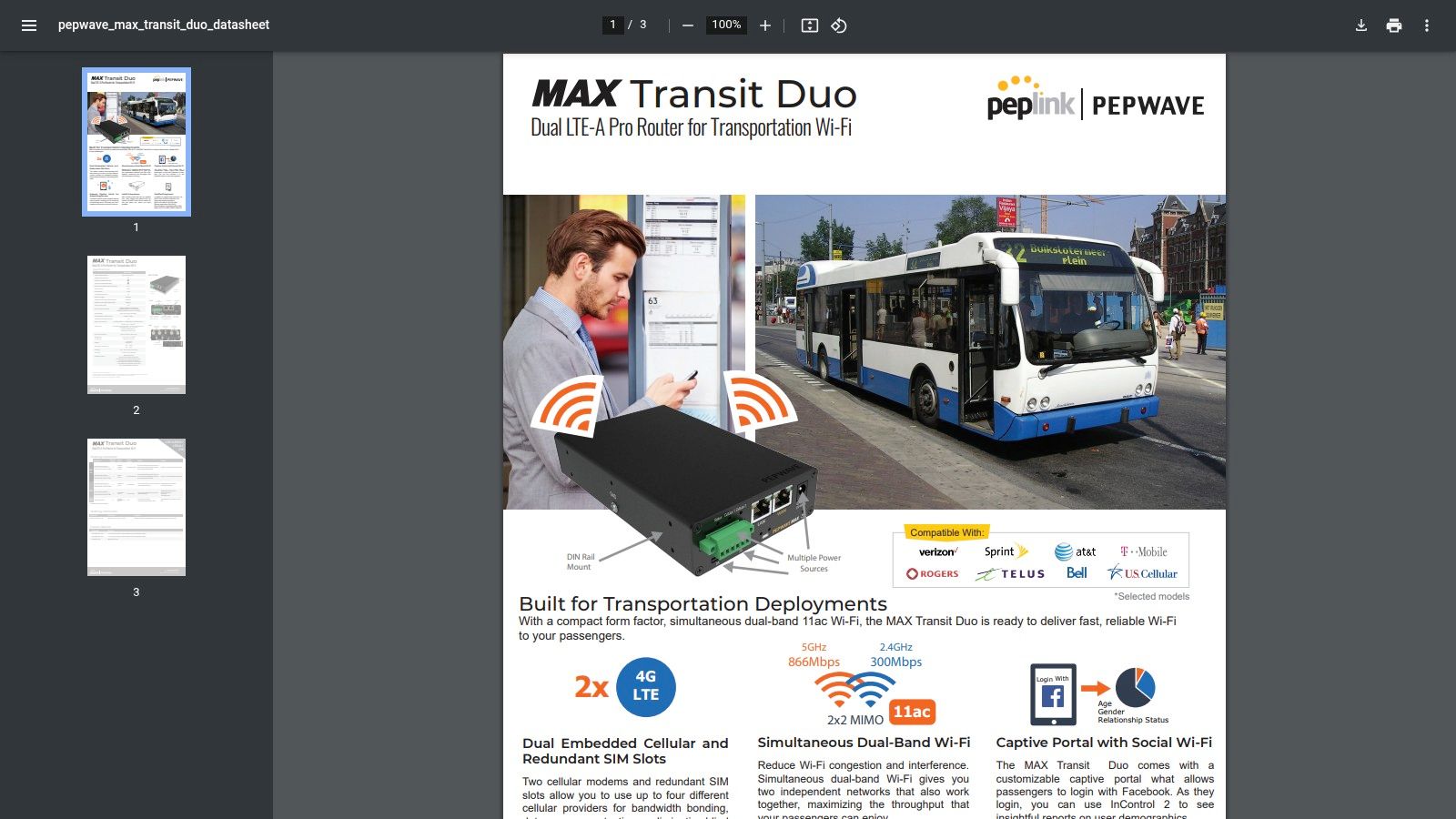
The key differentiator of the MAX Transit Duo is its dual-modem design. This allows you to insert two SIM cards from different carriers, enabling simultaneous connections to two different networks. This setup offers significant advantages for mobile internet for RV applications. First, it provides redundancy. If one carrier's network goes down or becomes congested, the Pepwave automatically switches to the other, ensuring you stay connected. Second, it allows for bandwidth aggregation through Peplink's SpeedFusion technology. SpeedFusion combines the bandwidth from both connections, delivering faster speeds and a more stable connection, perfect for demanding tasks like video conferencing or streaming.
The MAX Transit Duo also shines in its enterprise-grade features. It offers robust WiFi with extended range, multiple external antenna ports for optimizing MIMO signal reception, and sophisticated traffic management capabilities. You can prioritize certain types of traffic (like video conferencing) to ensure a smooth experience, even when bandwidth is limited. Advanced failover and load balancing features further contribute to its reliability. This router is purpose-built for mobile applications, featuring vibration resistance and a wide voltage input range, crucial for the often-challenging conditions of RV travel.
However, this premium performance comes at a premium price. The Pepwave MAX Transit Duo can cost between $1,300 and $2,000 depending on the configuration. The setup can also be quite complex, requiring some technical knowledge. You'll also need separate data plans for each SIM card, adding to the ongoing cost. Finally, its power consumption is higher than simpler mobile internet solutions, something to consider if you rely on limited power sources.
Pros:
- Carrier diversity: Connect to two carriers simultaneously for unparalleled redundancy.
- Enterprise-level reliability and performance: Designed for demanding applications.
- Extensive customization and configuration options: Tailor the device to your specific needs.
- Purpose-built for mobile: Vibration resistant and wide voltage input.
Cons:
- Very high cost: A significant investment compared to other mobile internet solutions.
- Complex setup: Requires technical proficiency.
- Requires separate data plans: Adds to the ongoing cost.
- Significant power consumption: Not ideal for extremely power-sensitive setups.
Implementation Tips:
- Invest time in understanding the configuration options to maximize the device's capabilities.
- Research carrier coverage in your travel areas to choose the best data plans for each SIM slot.
- Consider professional installation if you're not comfortable with networking configurations.
- Optimize antenna placement for the best possible signal reception.
The Pepwave MAX Transit Duo is a powerful tool for serious mobile internet users. While the cost and complexity may be prohibitive for some, for those who need the absolute best in terms of reliability, speed, and redundancy for mobile internet for RV life, it's an investment that pays dividends in consistent connectivity. Learn more on the Peplink website: https://www.peplink.com/products/max-transit-duo/
Top 7 Mobile Internet RV Providers & Devices Comparison
| Provider | Core Features / Connectivity ✨ | User Experience / Quality ★ | Value Proposition 💰 | Target Audience 👥 | Unique Selling Points 🏆 |
|---|---|---|---|---|---|
| 🏆 SwiftNet Wifi | 5G for rural & RV, tailored plans | ★★★★☆ Reliable in remote areas | 💰 Flexible plans, pricing on inquiry | 👥 Rural residents, RV travelers | 🏆 Advanced 5G tech, dependable |
| Verizon Wireless RV Plan | Largest LTE coverage, 5G expansion | ★★★★☆ Reliable, network prioritized | 💰 Higher cost, potential throttling | 👥 RV travelers in US rural areas | ✨ Extensive coverage, hotspot plans |
| Starlink Roam | Satellite internet, global/regional options | ★★★★☆ Unlimited data, consistent | 💰 High upfront + monthly fees | 👥 RV users needing coverage off-grid | ✨ Works where cellular can't |
| T-Mobile 5G Home Internet | Unlimited data, dedicated gateway | ★★★☆☆ Variable by location | 💰 Affordable flat-rate, no contract | 👥 Cost-conscious RV users | ✨ Battery backup, simple pricing |
| Nomad Internet | Multi-carrier reseller, specialized RV routers | ★★★☆☆ Flexible but mixed reviews | 💰 Higher than carriers, no contracts | 👥 RV users wanting carrier choice | ✨ RV-focused routers, multi-carrier |
| NETGEAR Nighthawk M6 Pro | 5G/4G hotspot, WiFi 6, touchscreen, 32 devices | ★★★★☆ Premium device experience | 💰 High device cost + carrier plan | 👥 RV families, multi-device users | ✨ Touchscreen, removable battery |
| Pepwave MAX Transit Duo | Dual modem, SpeedFusion bonding, enterprise features | ★★★★☆ Reliable, configurable | 💰 Very high cost, complex setup | 👥 Full-time RVers, tech-savvy pros | ✨ Dual carriers, failover/load balance |
Staying Connected on the Open Road: Making the Best Choice for You
Choosing the right mobile internet for RV life is crucial for staying connected while exploring the open road. This guide has explored several top options, from dedicated RV internet plans like Starlink Roam (formerly Starlink RV) and Nomad Internet, to cellular solutions like Verizon Wireless RV Internet Plan and T-Mobile 5G Home Internet, as well as versatile mobile hotspots such as the NETGEAR Nighthawk M6 Pro and Pepwave MAX Transit Duo. We also looked at all-in-one solutions like SwiftNet Wifi. Remember that each solution offers distinct advantages and disadvantages regarding data limits, speed, coverage, and cost. The most important takeaways are to carefully assess your data needs, budget, and travel style to determine the best fit for your mobile internet for RV setup.
Slow internet speeds can significantly impact your RV mobile internet experience. Before committing to a provider, it's a good idea to perform a website speed test to understand your current baseline and the potential improvements various solutions might offer. Source: Website Speed Test: A Practical Guide to Boosting Your Site Performance from CLDY
Consider factors such as where you’ll be traveling, how much data you’ll need, and how tech-savvy you are when choosing a mobile internet solution. Some options, like Starlink Roam, excel in remote areas, while others, like T-Mobile 5G Home Internet, shine in areas with strong 5G coverage. Choosing the right mobile internet for RV adventures empowers you to work remotely, stay entertained, and connect with loved ones, no matter where the road takes you.
Want a truly seamless and optimized mobile internet experience in your RV? Check out SwiftNet Wifi, a comprehensive solution designed specifically for RV living, offering reliable connectivity on the go. SwiftNet Wifi combines multiple internet sources for maximum coverage, giving you peace of mind and uninterrupted access to the digital world while enjoying the freedom of the open road.


















































